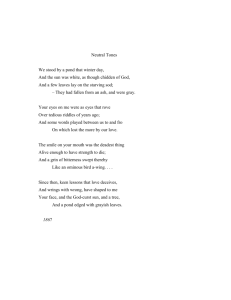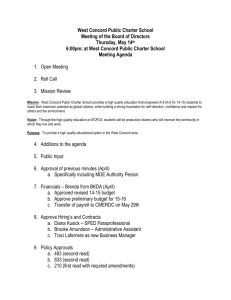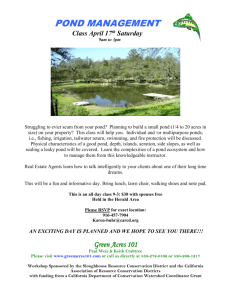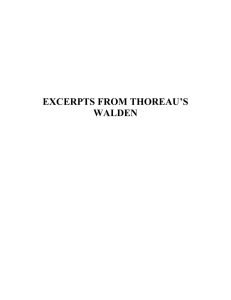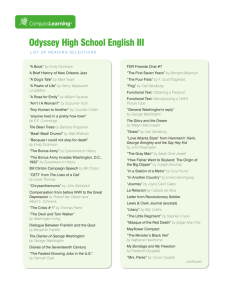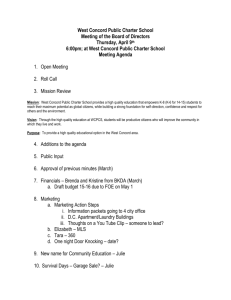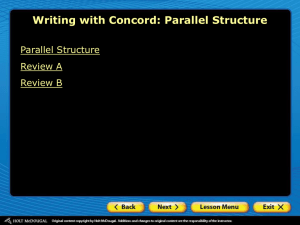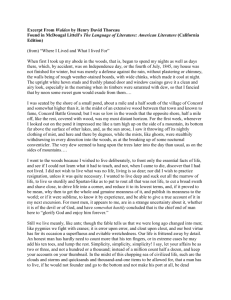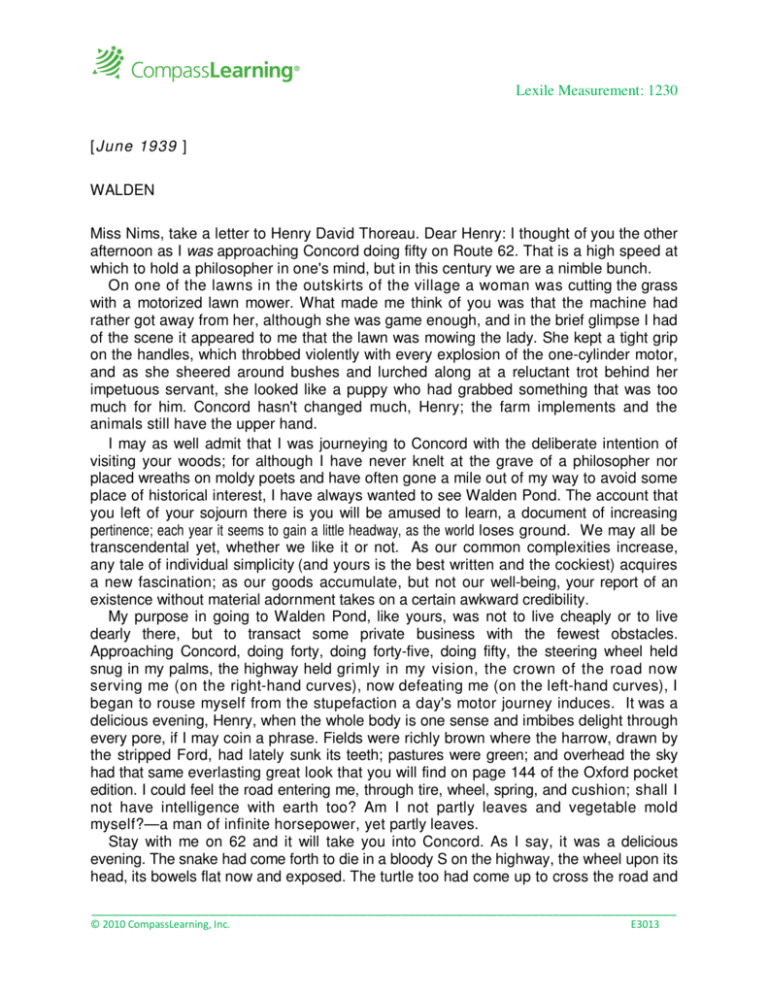
Lexile Measurement: 1230
[June 1939 ]
WALDEN
Miss Nims, take a letter to Henry David Thoreau. Dear Henry: I thought of you the other
afternoon as I was approaching Concord doing fifty on Route 62. That is a high speed at
which to hold a philosopher in one's mind, but in this century we are a nimble bunch.
On one of the lawns in the outskirts of the village a woman was cutting the grass
with a motorized lawn mower. What made me think of you was that the machine had
rather got away from her, although she was game enough, and in the brief glimpse I had
of the scene it appeared to me that the lawn was mowing the lady. She kept a tight grip
on the handles, which throbbed violently with every explosion of the one-cylinder motor,
and as she sheered around bushes and lurched along at a reluctant trot behind her
impetuous servant, she looked like a puppy who had grabbed something that was too
much for him. Concord hasn't changed much, Henry; the farm implements and the
animals still have the upper hand.
I may as well admit that I was journeying to Concord with the deliberate intention of
visiting your woods; for although I have never knelt at the grave of a philosopher nor
placed wreaths on moldy poets and have often gone a mile out of my way to avoid some
place of historical interest, I have always wanted to see Walden Pond. The account that
you left of your sojourn there is you will be amused to learn, a document of increasing
pertinence; each year it seems to gain a little headway, as the world loses ground. We may all be
transcendental yet, whether we like it or not. As our common complexities increase,
any tale of individual simplicity (and yours is the best written and the cockiest) acquires
a new fascination; as our goods accumulate, but not our well-being, your report of an
existence without material adornment takes on a certain awkward credibility.
My purpose in going to Walden Pond, like yours, was not to live cheaply or to live
dearly there, but to transact some private business with the fewest obstacles.
Approaching Concord, doing forty, doing forty-five, doing fifty, the steering wheel held
snug in my palms, the highway held grimly in my vision, the crown of the road now
serving me (on the right-hand curves), now defeating me (on the left-hand curves), I
began to rouse myself from the stupefaction a day's motor journey induces. It was a
delicious evening, Henry, when the whole body is one sense and imbibes delight through
every pore, if I may coin a phrase. Fields were richly brown where the harrow, drawn by
the stripped Ford, had lately sunk its teeth; pastures were green; and overhead the sky
had that same everlasting great look that you will find on page 144 of the Oxford pocket
edition. I could feel the road entering me, through tire, wheel, spring, and cushion; shall I
not have intelligence with earth too? Am I not partly leaves and vegetable mold
myself?—a man of infinite horsepower, yet partly leaves.
Stay with me on 62 and it will take you into Concord. As I say, it was a delicious
evening. The snake had come forth to die in a bloody S on the highway, the wheel upon its
head, its bowels flat now and exposed. The turtle too had come up to cross the road and
_____________________________________________________________________________________
© 2010 CompassLearning, Inc.
E3013
Lexile Measurement: 1230
die in the attempt, its hard shell smashed under the rubber blow, its intestinal
yearning (for the other side of the road) forever squashed. There was a sign by the
wayside that announced that the road had a "cotton surface." You wouldn't know what
that is, but neither, for that matter, did I. There is a cryptic ingredient in many of our
modern improvements—we are awed and pleased without knowing quite what we are
enjoying. It is something to be traveling on a road with a cotton surface.
The civilization round Concord today is an odd distillation of city, village, farm, and
manor. The houses, yards, fields look not quite suburban, not quite rural. Under the
bronze beech and the blue spruce of the departed baron grazes the milch goat of the
heirs. Under the porte-cochères stands the reconditioned station wagon; under the
grape arbor sit the puppies for sale. (But why do men degenerate ever? What makes
families run out?)
It was June and everywhere June was publishing her immemorial stanza; in the lilacs,
in the syringa, in the freshly edged paths and the sweetness of moist beloved gardens,
and the little wire wickets that preserve the tulips' front. Farmers were already moving
the fruits of their toil into their yards, arranging the rhubarb, the asparagus, the strictly
fresh eggs on the painted stands under the little shed roofs with the patent shingles.
And though it was almost a hundred years since you had taken your ax and started cutting
out your home on Walden Pond, I was interested to observe that the philosophical spirit
was still alive in Massachusetts: in the center of a vacant lot some boys were assembling
the framework of a rude shelter, their whole mind and skill concentrated in the
inauspicious helter-skeleton of studs and rafters. They too were escaping from town, to
live naturally, in a rich blend of savagery and philosophy.
That evening, after supper at the inn, I strolled out into the twilight to dream my
shapeless transcendental dreams and see that the car was locked up for the night (first
open the right front door, then reach over, straining, and pull up the handles of the left
rear and the left front till you hear the click, then the handle of the right rear, then shut
the right front but open it again, remembering that the key is still in the ignition switch,
remove the key, shut the right front again with a bang, push the tiny keyhole cover to
one side, insert key, turn, and withdraw). It is what we all do, Henry. It is called locking
the car. It is said to confuse thieves and keep them from making off with the laprobe.
Four doors to lock behind one robe. The driver himself never uses a laprobe, the free
movement of his legs being vital to the operation of the vehicle; so that when he locks
the car it is a pure and unselfish act. I have in my life gained very little essential heat
from laprobes, yet I have ever been at pains to lock them up.
The evening was full of sounds, some of which would have stirred your memory.
The robins still love the elms of New England villages at sundown. There is enough of
the thrush in them to make song inevitable at the end of day, and enough of the tramp to
make them hang round the dwellings of men. A robin, like many another American,
dearly loves a white house with green blinds. Concord is still full of them.
Your fellow-townsmen were stirring abroad—not many afoot, most of them in their
cars; and the sound they made in Concord at evening was a rustling and a whispering.
The sound lacks steadfastness and is wholly unlike that of a train. A train, as you know
who lived so near the Fitchburg line, whistles once or twice sadly and is gone, trailing a
memory in smoke, soothing to ear and mind. Automobiles, skirting a village green, are
_____________________________________________________________________________________
© 2010 CompassLearning, Inc.
E3013
Lexile Measurement: 1230
like flies that have gained the inner ear—they buzz, cease, pause, start, shift, stop,
halt, brake, and the whole effect is a nervous polytone curiously disturbing.
As I wandered along, the toc toc of ping pong balls drifted from an attic window. In
front of the Reuben Brown house a Buick was drawn up. At the wheel, motionless, his
hat upon his head, a man sat, listening to Amos and Andy on the radio (it is a drama of
many scenes and without an end). The deep voice of Andrew Brown, emerging from
the car, although it originated more than two hundred miles away, was unstrained by
distance. When you used to sit on the shore of your pond on Sunday morning, listening to
the church bells of Acton and Concord, you were aware of the excellent filter of the
intervening atmosphere. Science has attended to that, and sound now maintains its
intensity without regard for distance. Properly sponsored, it goes on forever.
A fire engine, out for a trial spin, roared past Emerson's house, hot with readiness for
public duty. Over the barn roofs the martins dipped and chittered. A swarthy daughter of
an asparagus grower, in culottes, shirt, and bandanna, pedalled past on her bicycle. It
was indeed a delicious evening, and I returned to the inn (I believe it was your house
once) to rock with the old ladies on the concrete veranda.
Next morning early I started afoot for Walden, out Main Street and down Thoreau,
past the depot and the Minuteman Chevrolet Company. The morning was fresh, and in a
bean field along the way I flushed an agriculturalist, quietly studying his beans. Thoreau
Street soon joined Number 126, an artery of the State. We number our highways
nowadays, our speed being so great we can remember little of their quality or character
and are lucky to remember their number. (Men have an indistinct notion that if they keep
up this activity long enough all will at length ride somewhere, in next to no time.) Your
pond is on 126.
I knew I must be nearing your woodland retreat when the Golden Pheasant lunchroom
came into view—Sealtest ice cream, toasted sandwiches, hot frankfurters, waffles,
tonics, and lunches. Were I the proprietor, I should add rice, Indian meal, and molasses—
just for old time's sake: The Pheasant, incidentally, is for sale: a chance for some nature
lover who wishes to set himself up beside a pond in the Concord atmosphere and live
deliberately, fronting only the essential facts of life on Number: 126. Beyond the Pheasant
was a place called Walden Breezes, an oasis whose porch pillars were made of old green
shutters sawed into lengths. On the porch was a distorting mirror, to give the traveler a
comical image of himself, who had miraculously learned to gaze in an ordinary glass,
without smiling. Behind the Breezes, in a sun-parched clearing, dwelt, your
philosophical descendants in their trailers, each trailer the size of your hut, but all
grouped together for the sake of congeniality. Trailer people leave the city, as you did, to
discover solitude and in any weather, at any hour of the day or night, to improve the nick
of time; but they soon collect in villages and get bogged deeper in the mud than ever. The
camp behind Walden Breezes was just rousing itself to the morning. The ground was
packed hard under the heel, and the sun came through the clearing to bake the soil and
enlarge the wry smell of cramped housekeeping. Cushman's bakery truck had stopped
to deliver an early basket of rolls. A camp dog, seeing me in the road, barked petulantly.
A man emerged from one of the trailers and set forth with a bucket to draw water from
some forest tap.
_____________________________________________________________________________________
© 2010 CompassLearning, Inc.
E3013
Lexile Measurement: 1230
Leaving the highway I turned off into the woods toward the pond, which was
apparent through the foliage. The floor of the forest was strewn with dried old oak
leaves and Transcripts. From beneath the flattened popcorn wrapper (granum
explosum) peeped the frail violet. I followed a footpath and descended to the water's
edge. The pond lay clear and blue in the morning light, as you have seen it so many
times. In the shallows a man's waterlogged shirt undulated gently. A few flies came
out to greet me and convoy me to your cove, past the No Bathing signs on which the
fellows and the girls had scrawled their names. I felt strangely excited suddenly to be
snooping around your premises, tiptoeing along watchfully, as though not to tread by
mistake upon the intervening century. Before I got to the cove I heard something that
seemed to me quite wonderful: I heard your frog, a full, clear troonk, guiding me, still
hoarse and solemn, bridging the years as the robins had bridged them in the sweetness
of the village evening. But he soon quit, and I came on a couple of young boys throwing
stones at him.
Your front yard is marked by a bronze tablet set in a stone. Four small granite posts,
a few feet away, show where the house was. On top of the tablet was a pair of faded
blue bathing trunks with a white stripe. Back of it is a pile of stones, a sort of cairn, left
by your visitors as a tribute I suppose. It is a rather ugly little heap of stones, Henry. In
fact the hillside itself seems faded, browbeaten; a few tall skinny pines, bare of lower
limbs, a smattering of young maples in suitable green, some birches and oaks, and a
number of trees felled by the last big wind. It was from the bole of one of these fallen
pines, torn up by the roots, that I extracted the stone that I added to the cairn—a
sentimental act in which I was interrupted by a small terrier from a nearby picnic group,
who confronted me and wanted to know about the stone.
I sat down for a while on one of the posts of your house to listen to the bluebottles
and the dragonflies. The invaded glade sprawled shabby and mean at my feet, but the
flies were tuned to the old vibration. There were the remains of a fire in your ruins, but I
doubt that it was yours; also two beer bottles trodden into the soil and become part of
earth. A young oak had taken root in your house, and two or three ferns, unrolling like
the ticklers at a banquet. The only other furnishings were a DuBarry pattern sheet, a page
torn from a picture magazine, and some crusts in wax paper.
Before I quit I walked clear round the pond and found the place where you used to
sit on the northeast side to get the sun in the fall, and the beach where you got sand for
scrubbing your floor. On the eastern side of the pond, where the highway borders it,
the State has added dressing rooms for swimmers, a float with diving towers, drinking
fountains of porcelain, and rowboats for hire. The pond is in fact a State Preserve,
and carries a twenty-dollar fine for picking wild flowers, a decree signed in all
solemnity by your fellow-citizens Walter C. Wardwell, Erson B. Barlow, and Nathaniel
I. Bowditch. There was a smell of creosote where they had been building a wide
wooden stairway to the road and the parking area. Swimmers and boaters were
arriving; bodies plunged vigorously into the water and emerged wet and beautiful in the
bright air. As I left, a boatload of town boys were splashing about in mid-pond,
kidding and fooling, the young fellows singing at the tops of their lungs in a wild
chorus:
_____________________________________________________________________________________
© 2010 CompassLearning, Inc.
E3013
Lexile Measurement: 1230
Amer-ica, Amer-ica, God shed his grace on thee,
And crown they good with brotherhood
From sea to shi-ning sea!
I walked back to town along the railroad, following your custom. The rails were
expanding noisily in the hot sun, and on the slope of the roadbed the wild grape and
the blackberry sent up their creepers to the track.
The expense of my brief sojourn in Concord was:
As you see, this amount was almost what you spent for food for eight months. I cannot
defend the shoes or the expenditure for shelter and food: they reveal a meanness and
grossness in my nature that you would find contemptible. The baseball equipment,
however, is the kind of impediment with which you were never on even terms. You must
remember that the house where you practiced the sort of economy that I respect was
haunted only by mice and squirrels. You never had to cope with a shortstop.
The essay called "Walden" was first published in the book "One Man's Meat" by E.B.
White; Harper & Row. Copyright 1938, 1939, 1940, 1941, 1942, 1943, 1944 by E.B.
White, renewed 1997 by Joel White. All rights reserved. "Walden" is included in this
electronically stored material produced by CompassLearning, Inc., by special
permission from the E.B. White Estate.
_____________________________________________________________________________________
© 2010 CompassLearning, Inc.
E3013


